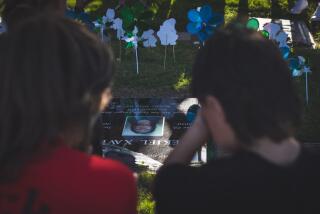Cocaine Is Found in Rogers’ Body : ‘Obviously, It Was a Lethal Dose,’ a Toxicologist Says
SACRAMENTO — A toxicologist confirmed on Sunday that former UCLA star football player Don Rogers died of a cocaine overdose.
James Beede, a toxicologist with the Sacramento County coroner’s office, told the Associated Press that laboratory tests showed that the drug was in Rogers’ system when he died of heart failure on Friday.
“Yes, there was cocaine found in the body,” Beede said. “Obviously, it was a lethal dose.”
Beede’s comments supported statements made on Saturday by Dr. Joseph Pawlowski, who conducted the autopsy, that Rogers--whose career was launched on the high school playing fields of Sacarmento--probably died of a drug overdose. The complete autopsy results are scheduled to be released at a press conference today.
Rogers, 23, an All-American from UCLA who was a standout safety with the Cleveland Browns the past two football seasons after being the team’s No. 1 draft selection, was to have been married on Saturday. But on Friday--hours after returning from a bachelor party--he collapsed and later died.
The death of Rogers--coupled with the cocaine intoxication death of University of Maryland basketball star Len Bias eight days earlier--has once again placed the spotlight on drug use among athletes.
Browns owner Art Modell declared: “I will say that tragically in death Don Rogers may have made more of a contribution to society than he could have on the playing field.
“Let’s hope his passing serves as a warning to those who want to try or have used drugs.”
UCLA Coach Terry Donahue, making his first comments since Rogers’ death, shied away from talking directly about Rogers’ use of drugs because he had not yet heard confirmation of that Sunday afternoon, but he addressed the problem of drugs. He said that UCLA would begin testing all of its athletes for drugs next fall, a project that has been in the planning stages for the last few years.
“A lot of people think that drug involvement is only by bad kids. But there are a lot of good kids out there that are tempted everyday.
“I think it’s clear that drug involvement is not limited to athletes. It’s a plague or a scourge that virtually encompasses all segments of society, from the very rich to the very poor, the very successful to the very unsuccessful.
“I feel strongly that there is a real obligation for all of us to face. We need to take some very strong positions. . . . I’m a very strong advocate of drug-testing and have been for a long time.”
Asked to comment on Al Davis’ recent statement we are facing the genocide of our youth, Donahue said: “I don’t think Al Davis was exaggerating in his statement. Unfortunately, I would agree with Mr. Davis. But I think it’s not limited just to young people.”
Donahue said that he thought there needed to be a change in attitude towards drugs, throughout our society. He said: “I hear and read the term ‘recreational drugs.’ That term in itself is, to me, ludicrous. It’s very difficult for me to understand that kind of thinking.”
When asked if he had ever had any trouble with Rogers in college, Donahue said: “Don Rogers was a model person from the time that he arrived at UCLA until the time he left. He was a player who was a joy to be around. He had a very lively and attractive personality. He attracted others with his warmth and his sensitivity to people.”
The Rogers family on Sunday continued to decline comment. Ted Chappelle, security director of the Browns, said the family wanted to await release of the complete autopsy results.
“We don’t know anything about it (the autopsy),” Chappelle said. “We’re not going to make a statement at this time. It’s premature.
“The family has gone through a very traumatic situation.”
Rogers’ mother, Loretha, 43, remained in serious condition at Community Hospital of Sacramento. She suffered a heart attack on Saturday and was rushed to the hospital. “Our aim is to keep her as quiet and rested as possible,” said nursing supervisor Cathy Faringer.
Outside the Rogers’ suburban Sacramento home, TV crews and newspaper reporters were camped out in case there were any new developments.
Sacramento police said they would have no further comment until the news conference today. On Saturday, police Sgt. Bob Burns said that until the toxicological reports were released there was no reason for the police detectives to begin an investigation.
In recalling Rogers, Donahue said: “There used to be a song called ‘Personality.’ That’s the way Donnie was. All personality. He was bubbly, friendly. But he was a tremendous competitor on the football field. You were always happy he was on your sideline and not the other sideline.
Mark Gladstone reported from Sacramento and Tracy Dodds from Los Angeles.
More to Read
Go beyond the scoreboard
Get the latest on L.A.'s teams in the daily Sports Report newsletter.
You may occasionally receive promotional content from the Los Angeles Times.






